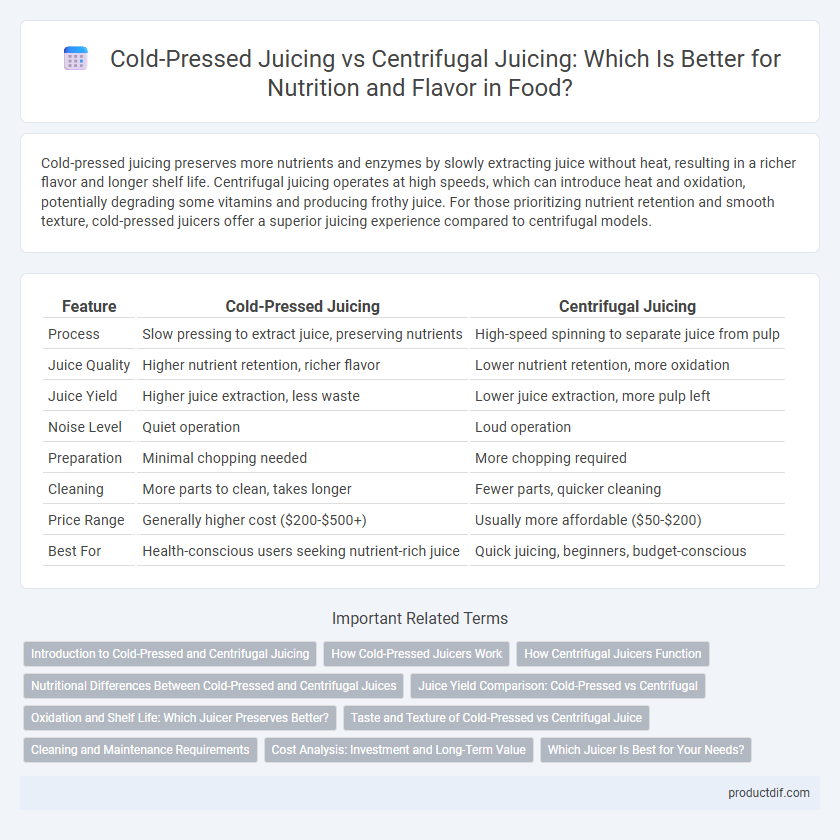Cold-pressed juicing preserves more nutrients and enzymes by slowly extracting juice without heat, resulting in a richer flavor and longer shelf life. Centrifugal juicing operates at high speeds, which can introduce heat and oxidation, potentially degrading some vitamins and producing frothy juice. For those prioritizing nutrient retention and smooth texture, cold-pressed juicers offer a superior juicing experience compared to centrifugal models.
Table of Comparison
| Feature | Cold-Pressed Juicing | Centrifugal Juicing |
|---|---|---|
| Process | Slow pressing to extract juice, preserving nutrients | High-speed spinning to separate juice from pulp |
| Juice Quality | Higher nutrient retention, richer flavor | Lower nutrient retention, more oxidation |
| Juice Yield | Higher juice extraction, less waste | Lower juice extraction, more pulp left |
| Noise Level | Quiet operation | Loud operation |
| Preparation | Minimal chopping needed | More chopping required |
| Cleaning | More parts to clean, takes longer | Fewer parts, quicker cleaning |
| Price Range | Generally higher cost ($200-$500+) | Usually more affordable ($50-$200) |
| Best For | Health-conscious users seeking nutrient-rich juice | Quick juicing, beginners, budget-conscious |
Introduction to Cold-Pressed and Centrifugal Juicing
Cold-pressed juicing extracts juice by slowly crushing fruits and vegetables using hydraulic pressure, preserving maximum nutrients, enzymes, and flavor. Centrifugal juicing utilizes high-speed spinning blades to shred produce and separate juice through centrifugal force, resulting in faster juice extraction but increased oxidation and nutrient loss. Understanding these juicing techniques helps consumers choose between nutrient retention and speed based on their health goals and lifestyle.
How Cold-Pressed Juicers Work
Cold-pressed juicers operate by slowly crushing and pressing fruits and vegetables to extract juice, preserving more nutrients and enzymes compared to traditional methods. This slow, hydraulic pressing reduces heat and oxidation, resulting in juice with higher vitamin content and longer shelf life. Their efficiency in extracting juice from leafy greens and fibrous ingredients makes them ideal for nutrient-dense, fresh juices.
How Centrifugal Juicers Function
Centrifugal juicers operate by rapidly spinning a flat cutting blade against a mesh filter, using high-speed centrifugal force to separate juice from fruit and vegetable pulp. The fast rotation quickly breaks down produce, extracting juice through the fine mesh while discarding the dry pulp. This method is efficient for hard fruits and vegetables but may produce more foam and heat, which can reduce nutrient retention compared to cold-pressed juicing.
Nutritional Differences Between Cold-Pressed and Centrifugal Juices
Cold-pressed juicing preserves more nutrients by using a slow, hydraulic press that minimizes heat and oxidation, retaining higher levels of vitamins, enzymes, and antioxidants compared to centrifugal juicing. Centrifugal juicers use high-speed blades to extract juice, which generates heat and increases oxidation, leading to nutrient degradation and lower enzyme activity. Studies show cold-pressed juices contain greater amounts of vitamin C, phytochemicals, and polyphenols, making them superior for maximizing nutritional benefits.
Juice Yield Comparison: Cold-Pressed vs Centrifugal
Cold-pressed juicing extracts juice by slowly crushing and pressing fruits and vegetables, resulting in higher juice yield and better nutrient retention compared to centrifugal juicing, which relies on high-speed spinning to separate juice. Cold-pressed methods can produce up to 20-30% more juice from the same amount of produce, minimizing waste and maximizing flavor concentration. Centrifugal juicers tend to generate more foam and heat, which may reduce juice volume and degrade enzymatic activity.
Oxidation and Shelf Life: Which Juicer Preserves Better?
Cold-pressed juicing minimizes oxidation by using slow, gentle pressure, preserving more nutrients and enzymes, which extends the juice's shelf life up to 72 hours when refrigerated. Centrifugal juicers generate heat and introduce more air during fast spinning, accelerating oxidation and reducing juice freshness to within 24 hours. Choosing cold-pressed juicers ensures higher nutrient retention and longer-lasting juice quality.
Taste and Texture of Cold-Pressed vs Centrifugal Juice
Cold-pressed juice retains more natural flavors and nutrients due to its slow extraction process, resulting in a richer, smoother taste and thicker texture compared to centrifugal juice. Centrifugal juicing, which uses high-speed blades, often introduces more air and heat, leading to a lighter taste and thinner consistency with potential oxidation. The enhanced freshness and vibrant flavor profile of cold-pressed juice make it a preferred choice for those seeking a premium sensory experience.
Cleaning and Maintenance Requirements
Cold-pressed juicers require more thorough cleaning due to their multiple components, including the auger and strainer, which can trap fibrous pulp and slow residue removal. Centrifugal juicers have simpler parts and wider feeding chutes, leading to quicker disassembly and easier rinsing, significantly reducing cleaning time. Regular maintenance of cold-pressed juicers prolongs blade sharpness and auger performance, while centrifugal models benefit from prompt cleaning to prevent motor overheating and blade dullness.
Cost Analysis: Investment and Long-Term Value
Cold-pressed juicers typically require a higher initial investment, often ranging from $200 to $500, but offer greater durability and nutrient retention, making them cost-effective over time. Centrifugal juicers are more affordable upfront, usually between $50 and $150, but their faster wear and lower juice yield may increase long-term expenses. Evaluating maintenance costs, energy consumption, and juice quality is essential for determining overall value in juicing methods.
Which Juicer Is Best for Your Needs?
Cold-pressed juicers extract juice by slowly crushing fruits and vegetables, preserving more nutrients and enzymes, making them ideal for health-conscious users seeking maximum juice quality. Centrifugal juicers operate with high-speed blades, producing juice quickly but with more oxidation and lower nutrient retention, suitable for those prioritizing speed and convenience. Choosing the best juicer depends on whether you value nutrient preservation and juice quality or fast, easy juicing for busy lifestyles.
cold-pressed juicing vs centrifugal juicing Infographic

 productdif.com
productdif.com